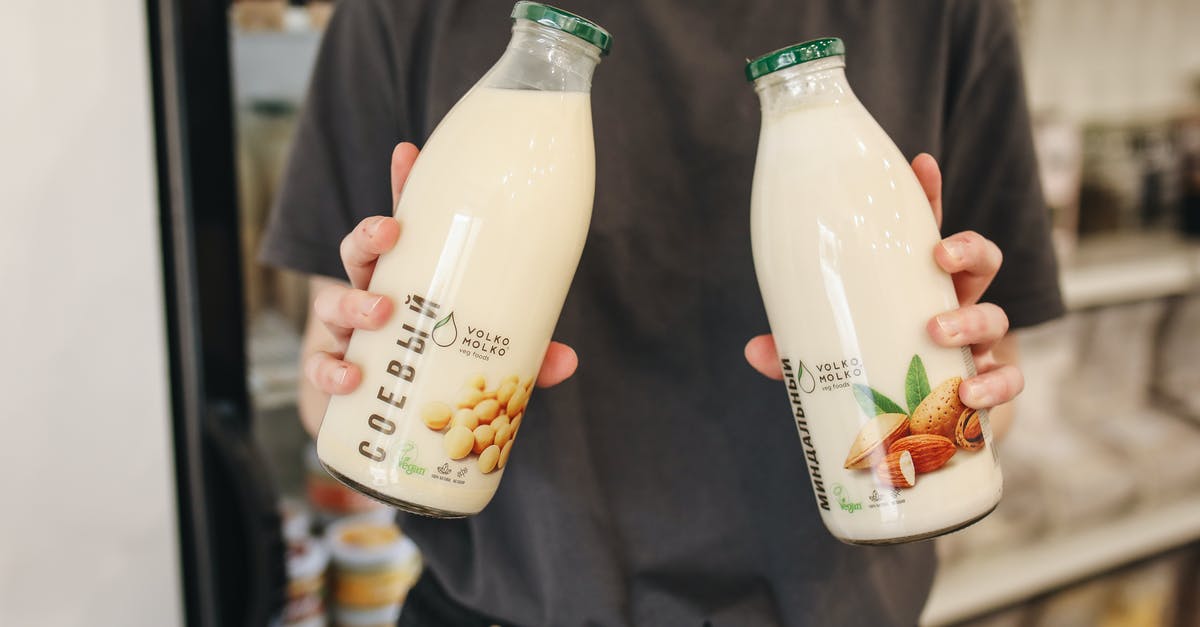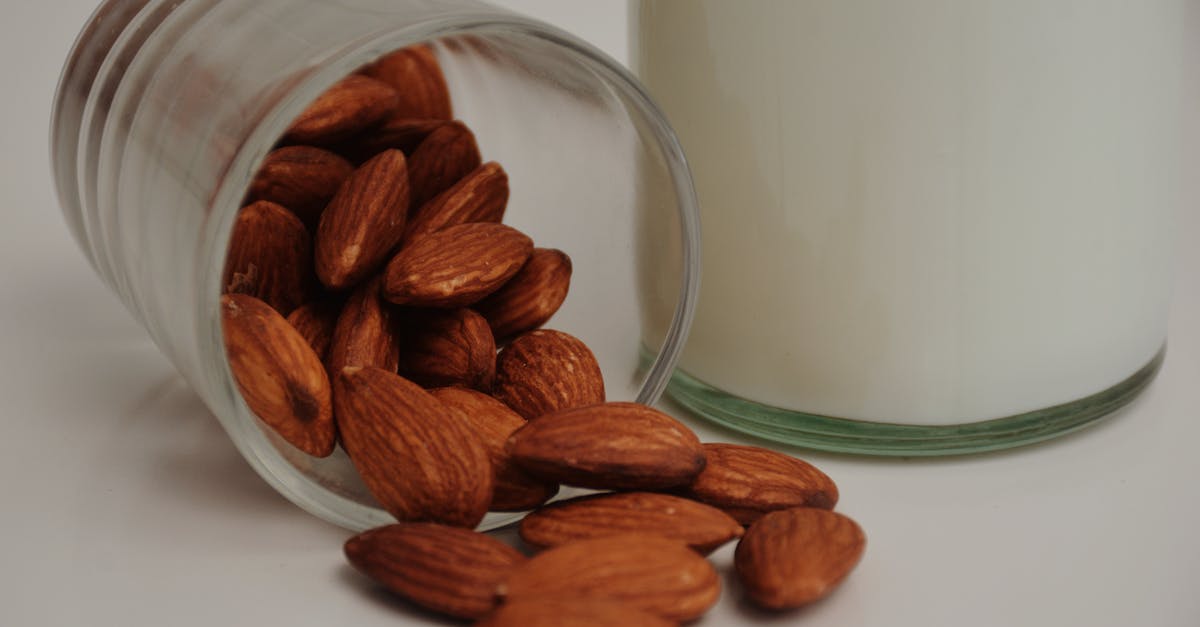Why isn't Almond Milk (and other non-animal based 'milk') considered juice?

As per the title, I consider "Milk" to be the substance secreted by living being to sustain their young, whether they be human, cow, dog, etc...
Almonds do not produce milk to sustain their young, in fact they are simply crushed. This reminds me more of juice than milk. So why don't people call it "Almond Juice"? Wouldn't this be more accurate?
The only reason I can think of as to why they would call it Milk would be to attempt to market it as a "milk alternative". Is that all there is to it? Or is there some defining feature that actually makes it fit the definition?
EDIT- Looks like I'm not the only one who finds this strange
Best Answer
One reason is simple appearance, I think - opaque white liquids or saps have long been called "milky", including nut milks, coconut milk, dandelion or milk thistle saps, and several other white substances. Nut milks get called milk because they look like milk to the eye.
Another reason is that nut milks behave like milks in recipes - they are emulsions with sugars, proteins, and fats... fruit juices tend to have nutrients and sugars, mostly, they behave rather differently in cooking. Almond milk was a long held substitute for animal milk in medieval times because it was more reliable - the nuts would be shelf-stable, while actual milk could spoil within hours. It is worth pointing out that nut milks were substitute for so long because they worked in dishes calling for milk, at both the chemical level and for rough flavor profiling.
Also, it is probably worth noting that nut milks taste like milk, as well - a mellow flavor, very mild and a bit rich. The flavor isn't strong or sweet like other juices. They are different from cow's milk, true, but perhaps nut milks are not immensely more different from cow's milk than it is different from sheep's milk or goat's milk.
In the end, nut milks get called milk because they seem similar, and there's no other category they fit into more neatly. If it is to label them as an alternative, it is a very old label, and for an alternative that works very well in nearly all applications.
Ps: if it helps, the nutrients extracted from the almonds into the milk were produced by the parent tree and intended to sustain the baby almond-plant... so the major difference is that the plant stores the milk in solid form, not whether it was meant for the next generation or not
Pictures about "Why isn't Almond Milk (and other non-animal based 'milk') considered juice?"



Quick Answer about "Why isn't Almond Milk (and other non-animal based 'milk') considered juice?"
These liquids are called milk because they are milky: white, opaque, sometimes have protein and fat. Either way, they aren't much like juice. The nuts aren't just crushed. They are ground and then soaked in water to leach out the good stuff.Is almond milk considered juice?
Non-dairy milks, including soy, almond, rice and coconut milk, are juices from nuts, seeds, grains and legumes that may be fortified with vitamins and minerals to deliver the equivalent nutrient profile and sometimes taste and consistency of cow's milk.Is milk considered juice?
For example, 'gastric juice' is the watery acid made by your stomach to help break down the foods that you eat. Milk is a liquid made by an mammal, it comes out when a part of that mammal's body is squeezed, and it tastes good to drink. So, yes, I think milk is a juice!Why is almond milk considered milk?
Defining milk \u201cAn almond doesn't lactate,\u201d according to FDA Commissioner Scott Gottlieb, so almonds cannot be milked. But defining milk by its method of production won't cut it. The US-based company Perfect Day, for example, makes dairy products without the involvement of any udders or even cows.Is almond milk a solid or liquid?
Almond milk is a plant-based liquid commonly used to substitute animal-based milk. It is made from almond nut seed through a mechanical process.Why Isn't It Possible
More answers regarding why isn't Almond Milk (and other non-animal based 'milk') considered juice?
Answer 2
I consider "Milk" to be the substance secreted from living being to sustain their young, whether they be human, cow, dog, etc...
Other people consider "milk" to have a wider definition than this. The Oxford English Dictionary (subscription required) gives a number of definitions of "milk" that are relevant to cooking:
1a. A whitish fluid, rich in fat and protein, secreted by the mammary glands of female mammals (including humans) for the nourishment of their young, and taken from cows, sheep, etc., as an article of the human diet.
2a. A milky juice or latex present in the stems or other parts of various plants, which exudes when the plant is cut, and is often acrid, irritant, or toxic. Also: [specifically] the drinkable watery liquid found in the hollow space inside the fruit of the coconut.
5a. A culinary, pharmaceutical, cosmetic, or other preparation resembling milk, esp. in colour. Usually with the principal ingredient or use specified by a preceding or following word. [Here, it specifically mentions soya milk, rice milk, almond milk and a number of alarming medical preparations from former times, such as "milk of mercury".]
5b. milk of almonds = almond milk
7. [originally North American] Strong alcoholic drink, often of a particular type, esp. whisky or beer. Sometimes with a preceding word suggestive of strength or ferocity, as in cougar milk, wild-mare's milk, etc.
For example, Wiktionary gives similar definitions, as will any other dictionary you might care to consult. Your assertion that milk is only the substance mammals use to feed their young is an example of what is known as the etymological fallacy: the belief that, because a word originally meant one particular thing, it must only mean that particular thing today.
Answer 3
Your definition for the word is not sufficiently broad. After all- coconut milk is a thing and it's more like juice than almond and rice milk are.
These liquids are called milk because they are milky: white, opaque, sometimes have protein and fat.
Either way, they aren't much like juice. The nuts aren't just crushed. They are ground and then soaked in water to leach out the good stuff.
Answer 4
It's called "milk" because that is what it most resembles in taste, texture and appearance, and it is also used as a substitute for people who can't or don't want to drink traditional cow's milk.
The choice of what they call it is strictly a product marketing decision, so strict scientific accuracy is not a consideration. What a biologist might refer to as "milk" is not a consideration.
From a cultural viewpoint, the stuff that Taco Bell churns out in no way resembles the actual foodstuffs they are named after. Vegetarian "burgers" are not all that much like the meat "burgers" they take their name from. The green "wasabi" you get at most Asian/Japanese sushi eateries contains no actual wasabi. There is often confusion when talking about what the layperson thinks of as a "theory" vs how science uses the term. Society is filled with examples everywhere of terms that are used that don't strictly fit a technical or scientific definition.
The name is chosen for familiarity and a convenient point of reference for consumers.
I don't think "juice" would not be more accurate, since almonds are seeds/nuts, not fruits or vegetables.
Answer 5
An edible almond is rather dry - and part of it (the shell) is even inedible and not useful to make food of at all. If you just pressed it, without adding water and heat, you would likely end up with impure almond oil and not a thin liquid like almond milk is. This would be like pressing dried beef instead of milking a cow and expecting milk. The same applies to rice, grains, cashews (where using the whole fruit would be actually poisonous!) and most other sources of plant milks.
Sources: Stack Exchange - This article follows the attribution requirements of Stack Exchange and is licensed under CC BY-SA 3.0.
Images: Polina Tankilevitch, Pegah, Alexander Mils, Emrah AYVALI
